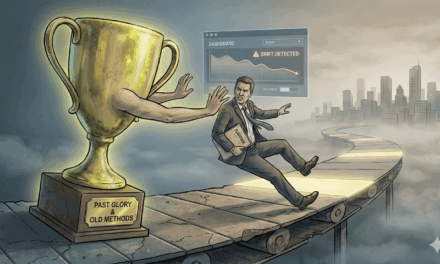
No on the No Show: Closing the Gap Between Scheduling and Success

Mastering the Art of Open Booked Demos: Closing the Gap Between Scheduling and Success
In the high-stakes arena of sales, the ability to convert interest into action is paramount. One critical juncture in this process is the period between booking and delivering a product demo—a phase we refer to as the “delta” of open-booked demos. This delta is not just a scheduled event on a calendar; it’s a pivotal phase that can significantly impact the effectiveness of your sales funnel. We can gain valuable insights into optimizing our sales strategies by focusing on this delta and understanding the actions and notations between the demo being booked and completed—such as no-shows, qualifications, and confirmations.
The Critical Delta: From Booking to Completion
The journey from booking a demo to actually taking place is crucial. Understanding the division between the booked demo and the actual moment it happens is essential. This delta must be continuously reviewed to comprehend the current state of your sales funnel—what’s in motion and what’s stagnating. By meticulously tracking all follow-up actions, their subjects, and outcomes, you can identify gaps between the booking and executing demos, ultimately projecting whether a demo will be completed or result in a no-show.
Understanding Open Booked Demos
Open-booked demos are scheduled demonstrations that have yet to occur. They represent potential sales opportunities but also carry the risk of no-shows or cancellations. Managing this phase requires meticulous attention to detail within your Customer Relationship Management (CRM) system. By implementing delineations within your CRM—such as tick boxes that indicate different points of qualification, confirmation, and engagement—you can monitor the progress of each demo. These indicators might include whether the decision-maker has accepted the calendar invite, confirmed attendance due to a compelling value proposition, or engaged with preliminary information or the platform itself. Such detailed tracking lets you understand where each opportunity stands and reinforces the client’s commitment to attend the demo.
Optimizing CRM Tracking
To effectively monitor open booked demos, it’s essential to:
- Implement Clear Indicators: Use checkboxes or status updates in your CRM to denote when a demo is booked and completed. This could include a “Demo Completed” tick box or a “Demo Booked” date as a marker rather than just noting the actual date.
- Track Key Milestones: Note whether the client has accepted the calendar invite, confirmed their attendance due to the value proposition, or actively engages with your platform or service.
- Monitor Engagement Levels: Assess the client’s interaction with your platform before the demo. Are they active on the platform? Have they received and acknowledged any preliminary information?
By capturing these data points, sales teams can identify which demos are on track and which may require additional attention. Understanding the ones in the space between booking the demo and the actual demo allows you to address potential issues proactively.
Strategies to Bridge the Gap
1. Reinforce the Value Proposition
Ensure that the client understands the unique benefits of your product or service. This reinforcement should occur during initial outreach and continue through follow-up communications. By taking the time upfront to qualify prospects and justify the scheduled demo adequately, you confirm that the opportunity is with someone who can purchase, wants to buy, and knows why they’re buying. Asking the right questions and conveying a compelling value proposition gives the sales team and the client confidence in the upcoming demo.
2. Confirm Commitment with Decision-Makers
Engage directly with key stakeholders to secure their commitment to attend the demo. It is crucial to reinforce with the decision-maker that they will participate due to the compelling value proposition. Personal outreach can significantly reduce the likelihood of no-shows. This may involve:
- Personalized Emails: Craft messages that speak directly to their interests and reinforce the value proposition.
- Direct Calls: A phone conversation can reinforce the importance of the demo, address any concerns, and confirm their attendance.
- Calendar Invite Acceptance: Encourage them to formally accept the calendar invite, perhaps tracking this in your CRM with a specific tick box, solidifying their commitment.
3. Leverage Active Engagement
Involve the client with your platform or service before the demo. Providing access to trial features, preliminary content, or informational resources can increase their investment in the process and heighten anticipation for the demo. This active engagement also allows the Business Development Representative (BDR) or salesperson to evaluate the client’s level of interest and activity, helping to identify demos that may be at risk due to lack of engagement. By reinforcing this activity through proper evaluation, you can focus efforts on ensuring these demos proceed successfully.
Zero Tolerance for No-Shows
Adopting a zero-tolerance policy for no-show demos is crucial for accelerating deal cycles and bringing deals to fruition more quickly. Allowing demos to be missed without consequence leads to drift and slip in your deals, indicating a lack of upfront qualification and justification. You risk wasting valuable resources by not ensuring that the scheduled demo is with someone who can purchase, wants to buy, and knows why they’re purchasing. To combat this:
- Qualify Leads Thoroughly: Ensure those booking demos have a genuine interest and authority to make purchasing decisions. The sales team must ask appropriate questions to gain confidence that the demo is with a viable prospect.
- Provide Reminders: Use automated reminders and personal check-ins to keep the dominant in the client’s mind.
- Establish Accountability: Sales team members should be responsible for their booked demos, with incentives aligned toward booking and completing demos. This accountability ensures that the focus remains on meaningful outcomes rather than vanity metrics.
Aligning Team Incentives
Sales representatives—particularly BDRs and SDRs—are often motivated by the number of demos they book rather than the quality or completion rate. This misalignment leads to a focus on vanity metrics, where the short-term satisfaction of saying they booked a demo outweighs the long-term benefits of having demos that sit and lead to active deals.
We might assume that the bonus for a demo sitting would motivate BDRs and SDRs to ensure demos occur. However, many top-of-funnel salespeople prioritize the immediate recognition of booking a demo over the cumulative bonuses associated with demos that sit over time. They may not follow up with a deal once it has been forgotten and the initial vanity metric is no longer in the spotlight.
Shifting the Focus
- Incentivize Completed Demos: Adjust bonus structures to reward not just the booking of demos but also their successful completion. This encourages sales representatives to ensure that demos sit and progress into active deals.
- Promote Long-Term Success: Encourage team members to focus on increasing their income through sustained performance—having demos that sit and lead to sales—rather than seeking short-term ego boosts from the number of demos booked.
- Foster a Team-Oriented Culture: Cultivate an environment where building a profitable company is prioritized over individual recognition. This involves eradicating the desire to be seen for vanity metrics and nurturing those committed to contributing to the company’s long-term success.
Building a Profitable Foundation
The ultimate goal is to nurture a sales team, prioritizing the company’s profitability and growth over personal recognition. This involves:
- Eradicating Counterproductive Behaviors: Identify and address the actions of team members who are more interested in being seen and having their egos stroked by booking demos than ensuring those demos lead to sales.
- Cultivating Dedicated Professionals: Support and grow those focused on increasing their income through meaningful contributions—having demos that sit and deals that close—and committed to building a profitable company.
- Continuous Improvement: Regularly assess and refine your sales processes, incentive structures, and team dynamics to enhance efficiency and effectiveness in managing open-booked demos. By living in a zero-tolerance environment for no-shows and vanity metrics, you can drive the entire team toward collective success.
Conclusion
Understanding and managing the delta between booking and delivering demos is a critical aspect of the sales process that must be reviewed constantly. By meticulously tracking this phase, reinforcing the value proposition, and aligning team incentives with the company’s profitability goals, organizations can significantly reduce no-shows and increase the conversion rate of demos to sales.
In the competitive sales landscape, mastering this process accelerates deal cycles and contributes to building a resilient, profit-driven company. It’s about transforming potential into performance, ensuring that every booked demo is not just a scheduled event but a strategic step toward success.



































